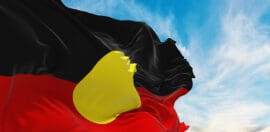How an Indigenous-led supply chain is good for business

6 October 2022 at 1:54 pm
Chocolate on Purpose is building a network of First Nations employees, suppliers and partnerships that is propelling the chocolate industry to do better.
Australia’s first 100 per cent Indigenous-owned chocolate company, Chocolate on Purpose, is on a mission to heal. Not only is its unique use of bush food ingredients drawing on traditional remedies for the body, but its operations are creating a curative connection to community and country.
CEO and founder Fiona Harrison discovered the healing benefits of native botanicals firsthand as a vessel to treat her experiences of PTSD and intergenerational trauma. She went on to study aromatic botanical medicine to relate to her Aboriginal heritage before turning to chocolate.
“My family’s story is one of disconnection from culture, where at one point, it was just easier for the old people to say they weren’t Aboriginal because it kept the kids safe,” says Harrison.
“I wanted to find a way to share the healing power of botanicals in a way that was easy to access. My ancestors have been using bush foods for over 60,000 years and so I thought of making chocolate with Australian native ingredients.
“Chocolate became the vehicle that would deliver impacts that are bigger than both myself and the business, hence Chocolate on Purpose.”
The biggest impact from the purpose-led company comes from its creation of an Indigenous-led supply chain, which promotes First Nations employment and empowerment, and contributes to the formation of a circular economy.
“From the very beginning, I wanted to build the business on foundations that were meaningful. The more value-add producers, especially Indigenous producers, that are using Indigenous ingredients, the more we will support Indigenous growers. So together we have a circular benefit,” continues Harrison.
“When I have to find a new supplier, I try to find an Indigenous business – and that even includes my accountant and graphic designer. We talk about employment for marginalised groups – I think that’s more than just giving them a job, I think that’s actually supporting businesses in an ongoing way.”
Chocolate on Purpose is a member of the First Nations Bushfood and Botanical Alliance Australia, which aims to return custodianship of the Australian native food industry to First Nations communities, and partners with the Native Harvest Institute to source native ingredients directly from Aboriginal communities. The company also offsets its carbon footprint through the Aboriginal Carbon Foundation (AbCF).
“Less than two per cent of producers in the Australian native botanical and food supply chain are actually Indigenous, in spite of the industry being built on their IP with no return to community. Even less are women,” continues Harrison.
“Hopefully, once I can grow my capacity, I can move into employment and have women come in and reclaim their sovereignty because bush food is women’s business. They were the traditional holders of the knowledge.”
Other ethical practices include Chocolate on Purpose not using palm oil in its products and sourcing cocoa from members of the Cocoa Horizons Foundation, a not-for-profit program focused on farmer prosperity and building self-sustaining communities. Each of these practices help to shift negative stigma associated with environmental degradation and child labour that has plagued the chocolate industry.
“I always say that sustainable cocoa and not using palm oil is the very least a chocolate business should do. But there’s still a bit of hoodwinking and it can be really non-transparent,” continues Harrison.
“I think that if your aim is to be an ethical person in business, then you do need to spend time researching that information and asking a lot of questions. That’s what I do about everything in my supply chain.”
“Rather than just buying my ingredient and leaving it at that, I make a connection with my rep, and then with my distributor and my manufacturer and so on. It’s an evolution but finding reliable people and realising the importance of your network is key,” she concludes.







